DAC7 Reporting Directive Overview: How It Affects You and Your Platform Income
DAC7 means online platforms now report your income to EU authorities. Even small gigs count — here’s what freelancers need to know.
August 4, 2025
August 4, 2025
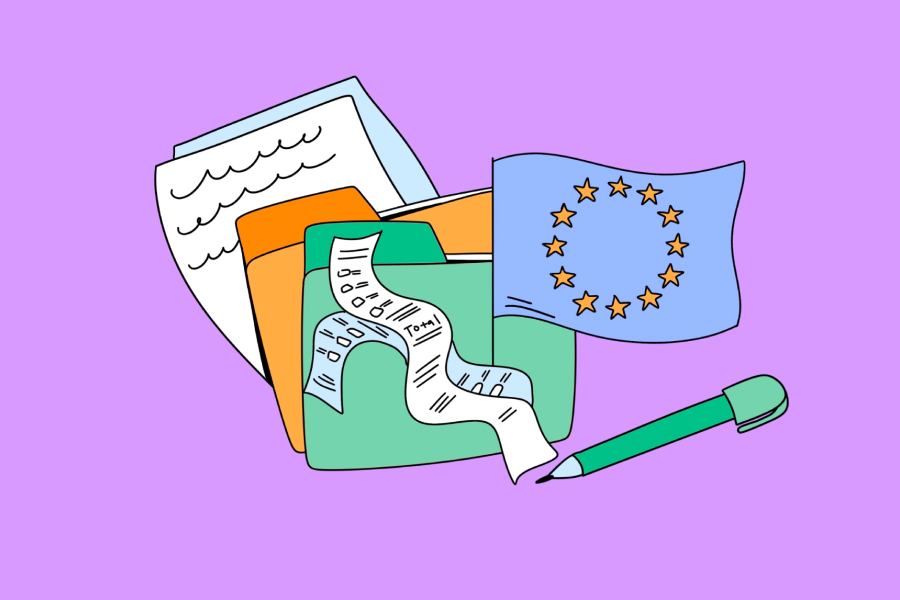
Key points:
- DAC7 is an EU tax transparency law that requires digital platforms to report seller income.
- If you earn money through online platforms — whether you’re based in the EU or not — your income info might now be shared with EU tax authorities.
- DAC7 doesn’t introduce new taxes; it just makes your income more visible.
- Many freelancers and small sellers are affected, even unintentionally.
- To make sure you’re staying compliant, check if you’re a reputable seller, register with your local tax office, and keep clean records.
If you earn money through platforms like Vinted, Upwork, or Airbnb, you might’ve seen emails about the DAC7 directive and panicked a little. Don’t worry. It’s not a new tax. But it is a new set of reporting requirements that makes digital platform operators responsible for sharing certain information with EU tax authorities.
In short: platforms now have to report sellers’ revenue to help improve transparency and cross-border compliance. If you’re a freelancer or small seller, this guide will walk you through what DAC7 actually is, who’s affected, and what (if anything) you need to do.
What is DAC7?
DAC7 is a set of rules introduced by the European Union to improve tax transparency in the online economy. DAC7 stands for the Directive on Administrative Cooperation, and this is its seventh amendment — hence “DAC7.” It requires digital platforms like marketplaces, gig apps, and rental services to collect information about the people earning money through them and share that data with EU tax authorities.
So, if you’re using platforms like Etsy, Vinted, Fiverr, or Airbnb to sell products, offer services, or rent out property, the platform may now be reporting your income to the tax office automatically. This doesn’t mean that you suddenly owe more tax. But if you weren’t reporting this income before, it could now raise questions, and in some cases, lead to penalties, audits, or may force you to backfile. What used to be invisible is now very visible.
Why it was introduced (and why now)
EU Council Directive 2021/514, aka DAC7, entered into force on 1 January 2023. This means that the first exchange of information took place at the end of February 2024, covering the whole of 2023.
To put it simply, the reason DAC7 was introduced was to close tax gaps, with more and more people earning income online. This commonly takes place across borders, and often without traditional employers, making it harder for tax authorities to track who’s earning what, and where.
DAC7 was introduced to solve that. It’s part of the EU’s broader effort to modernise tax systems, reduce fraud, and make sure everyone’s playing by the same rules, including digital sellers and freelancers.
Who does DAC7 affect?
There are two main groups that are affected by DAC7:
- Online platforms
- Those who earn money using these platforms. This includes freelancers, solopreneurs, small sellers, and hosts.
If you’re selling goods on Etsy, offering services on Fiverr or Upwork, or renting out a flat on Airbnb, you could be affected. It doesn’t matter if it’s your full-time job or just a side hustle. If you’re making money through a digital platform, and you’re in the EU or selling to EU clients, you’re likely to be within DAC7’s scope.
It also applies to the platforms themselves. Whether they’re based inside or outside the EU, platform operators must collect and report information about sellers if they have users in the EU or deal with EU-based transactions.
Freelancers and the definition of a “reportable seller”
Not every person who makes money online is affected by DAC7, but many are, often without realising it. Under DAC7, a “reportable seller” may be someone who earns income through a digital platform by doing things like:
- Selling goods (secondhand clothes, art, handmade items, and so on)
- Providing services (freelance work, tutoring, delivery, or coaching)
- Renting out property (such as short-term holiday rentals)
If you’re doing these things, it doesn’t make you a reportable seller automatically. Whether you count as a “reportable seller” depends on the type of activity you do and, in some cases, how much you earn.
If you’re selling goods, you’re only reportable if you’ve made 30+ sales or earned 2 000 EUR or more in a calendar year. If you’re providing services or renting out property, there’s no threshold — you’re reportable from the first euro, unless you fall into an excluded category (more on those later).
Many freelancers don’t realise that VAT status or informality doesn’t exempt them. If the platform considers you “reportable,” they’ll likely share your income data with tax authorities, even if you’ve never filed taxes on that income yourself.
One of my clients, a designer in Portugal selling digital templates on Etsy, reached out in a panic after receiving a DAC7 notice. She had no clue that Etsy was now reporting her earnings to tax authorities and assumed since she was under the VAT threshold, she didn't need to do anything. The real problem? She hadn't reported any income for the past two years, thinking it was just "side income." She ended up having to backfile and get professional help to avoid penalties.
{{Raphael Larouche}}
Platforms that fall under DAC7
DAC7 applies to digital platforms: websites or apps that let people earn money by selling goods, offering services, or renting out property. This includes major names like:
- Etsy, Vinted, and eBay (goods)
- Upwork, Fiverr, and TaskRabbit (services)
- Airbnb, Booking.com, and Turo (property and transport rentals)
Even if a platform is not based in the EU, it still has to follow DAC7 rules if it has sellers in the EU or helps sell/rent to EU-based customers.
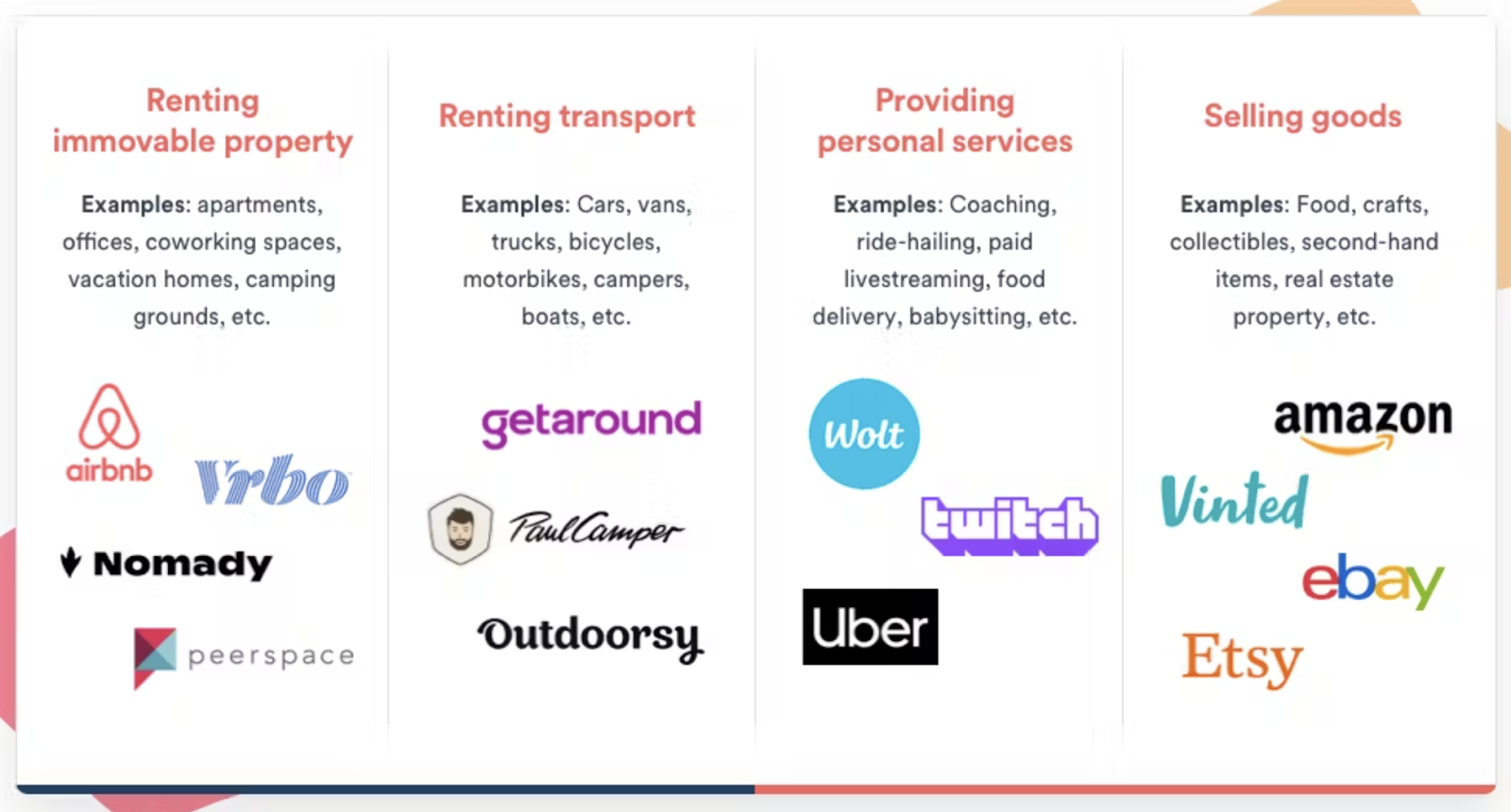
Who’s excluded
Not every platform or seller falls under the scope of DAC7. As far as platforms go, DAC7 excludes those that:
- Only process payments (think PayPal, Stripe)
- Only let users advertise or list services
- Redirect traffic to other sites.
In other words, if the platform doesn’t handle the money flow or the user connection directly, it’s generally not included.
There are exclusions for sellers, too:
- Government bodies
- Listed companies
- Large-scale property renters like hotel chains or tour operators
- Casual sellers of goods that stay under the thresholds we discussed above.
Check out this video from SimplyVAT tax consultants on DAC7:
Common misconceptions
Some of the most common misconceptions around DAC7 have to do with existing tax rules — especially income tax and VAT.
Let’s start with income tax. If you’re earning self-employed income, you’re technically supposed to declare it and pay tax on it. But many people don’t, especially if they’re earning below their country’s tax-free allowance. For example, in Germany last year it was 11,604 EUR, and it’s different in every country. So, a lot of small sellers or side hustlers didn’t bother declaring anything — if there’s no tax due, what’s the point? DAC7 changes that. Even if you’re under the national tax threshold and wouldn’t owe any tax, your platform may now report your income to the tax authorities anyway. That doesn’t mean you suddenly owe money, but you might have to explain where it came from.
Now let’s talk about VAT (aka value added tax), which is a different thing altogether. Most EU countries require anyone earning money from their work or sales to register for VAT once they cross a certain income level — whether you’re a solo freelancer or a full company. The exact number depends on your country. For example, in Germany it’s 22,000 EUR and in Portugal it’s 13,500 EUR.
When you register for VAT, you’re telling the tax office, “I’m now earning enough that I need to charge VAT on what I sell.” Once registered, you’re expected to add VAT to your invoices, keep track of it, and submit regular VAT returns. And this is what trips people (like Raphael’s client from Portugal) up: DAC7 has nothing to do with VAT. Even if you’re under the VAT threshold and not registered, the platform can still report your income under DAC7.
What are platforms reporting about you?
You might be surprised by how much your platform knows and what it’s now required to share. Under DAC7, digital platforms must collect and verify information about their sellers, and send it to the relevant tax authorities once a year.
The type of data collected
Most platforms will ask for your full name, address, tax identification number (TIN), and date of birth (if you’re an individual). If you’re a business, they’ll also want your VAT ID and business registration number. On top of that, they report how much you earned, how many transactions you made, and any fees or commissions they withheld.
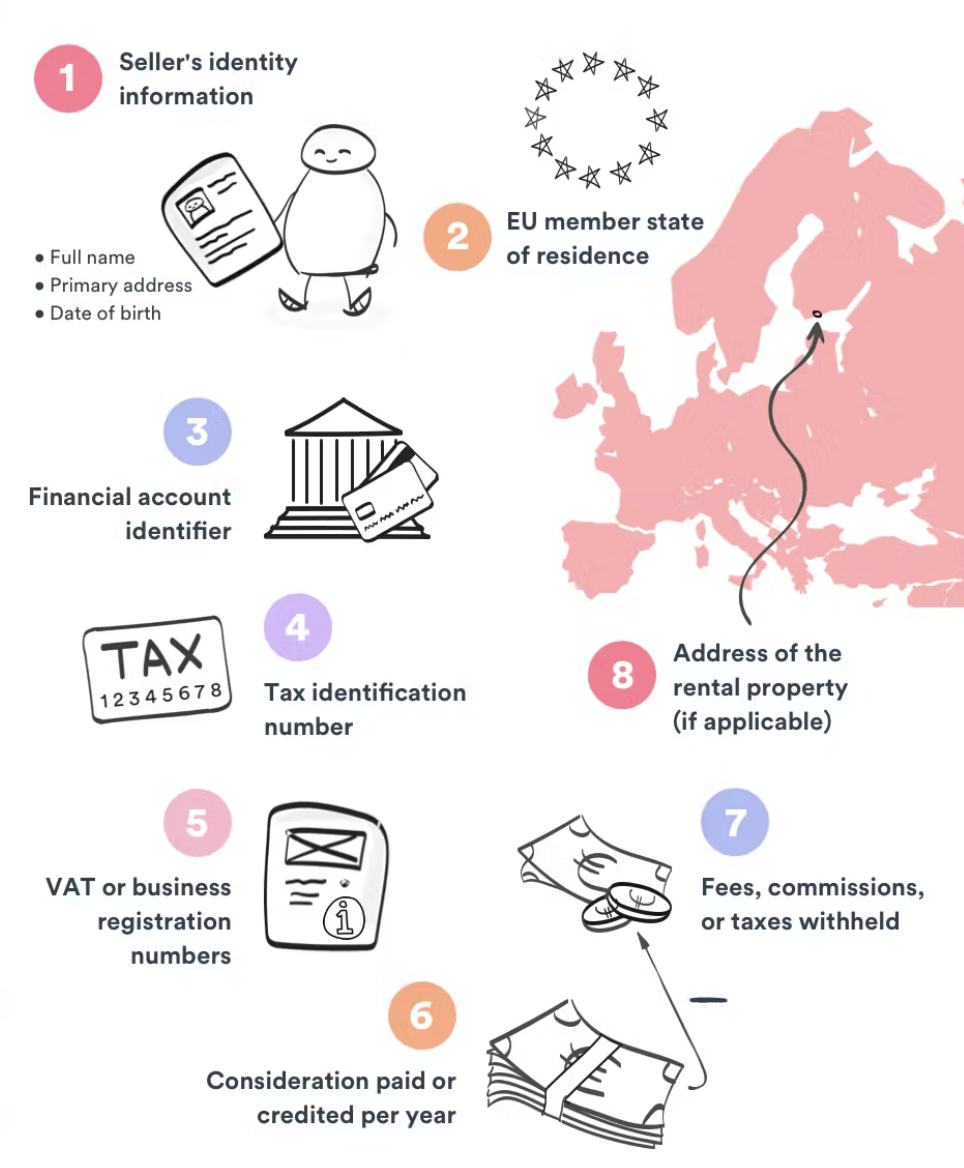
How platforms verify and submit your info
Platforms usually ask you to upload identity documents (like a passport or national ID) and fill out a tax residency self-certification form. Some platforms cross-check this information automatically.
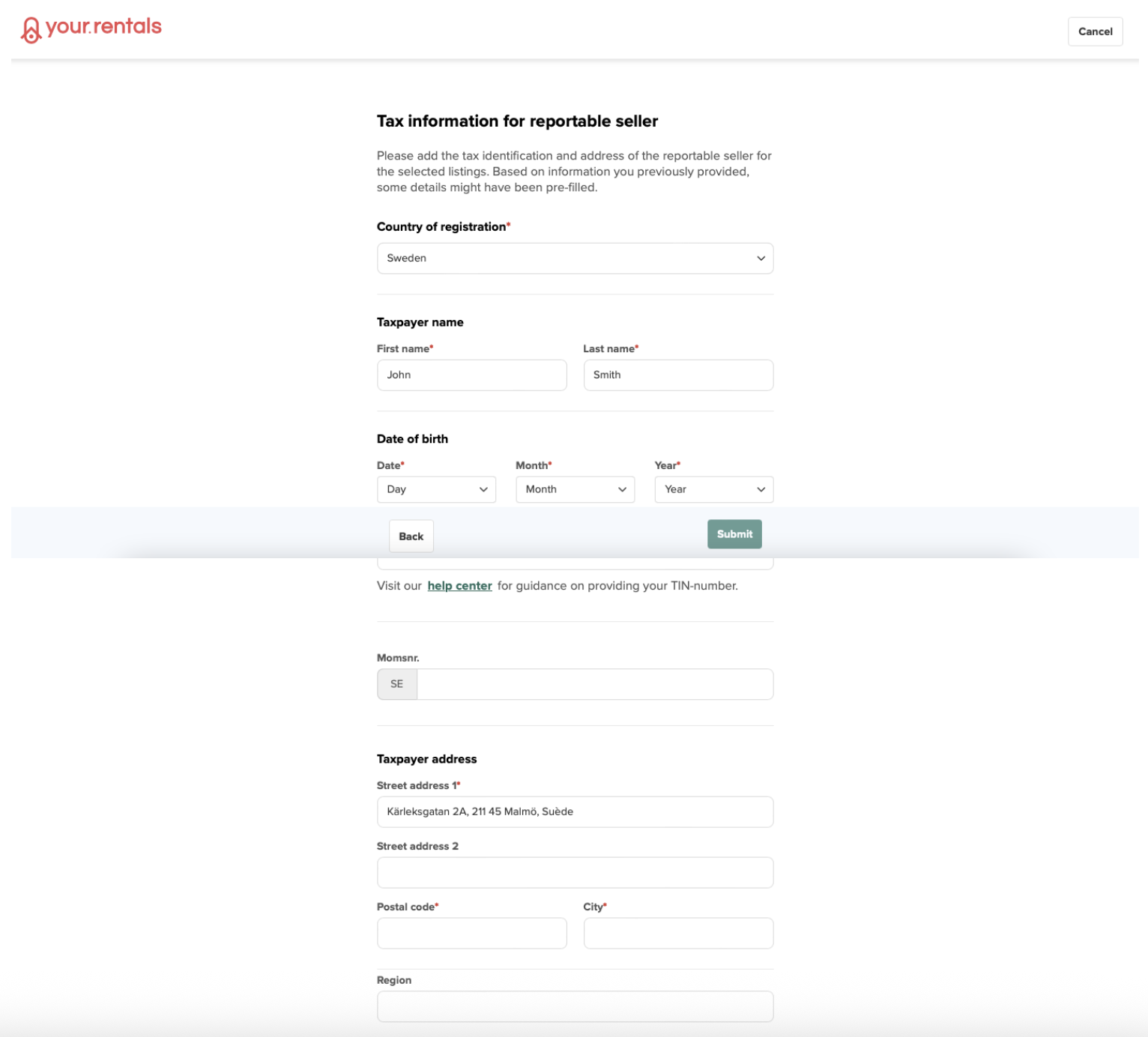
Both Fiverr and Upwork requested my tax and identity data, citing DAC7. Fiverr laid it out clearly: "we're required to report EU earnings." Upwork slipped the notice into an FAQ update. Harder to spot.
{{Nick Mikhalenkov}}
Once verified, the platforms compile an annual report with all required details, like your income, country of residence, and platform activity, and submit it to the tax authority in the EU country where you reside or where the income was generated. If you’re based outside the EU but have EU clients, your data is sent to the relevant EU authority based on where your clients are located. Reports are due by 31 January covering income from the previous calendar year.
How does this affect freelancers?
So what does all this mean if you’re a freelancer? Here’s how DAC7 could affect you in practice.
What this means for your taxes
Let me reiterate: DAC7 doesn’t introduce new taxes. It simply makes it harder to ignore the ones that already exist. Before DAC7, many freelancers and sellers earning income through platforms operated in a kind of grey zone. If they were below the VAT or income tax threshold, lived outside the EU, or assumed platforms weren’t reporting their income, they often didn’t declare it. Some weren’t aware they needed to. Others didn’t think anyone would notice.
Now, platforms are required to report that income directly to EU tax authorities. Let’s imagine you earned 800 EUR last year from renting out your property on AirBNB in Spain. That's well under the income tax threshold, but DAC7 means Airbnb is still likely to report it. So, even if you don’t owe any tax, it could trigger questions from tax authorities.
Even though I'm not a tax advisor, I now always flag this to EU clients during onboarding. DAC7 has made platform-based earnings far more visible, and it's forcing a shift in how freelancers treat their online businesses. They're no longer flying under the radar and many are realizing it a bit too late.
{{Raphael Larouche}}
Does DAC7 change your obligations?
DAC7 doesn’t change any of your obligations officially, but it does change what you should be doing in practice. Even if you’re only making a tiny amount of money through a platform, you need to start taking reporting seriously. This entails:
- Registering as self-employed (if you haven’t already)
- Declaring your income, even if it’s under the tax-free allowance
- Keeping records of what you earned, when, and through which platform
- Understanding your VAT position, especially if you’re nearing the threshold
Since the platforms are now sharing this data with your local tax authority, your income is now going to be on their radar, even if you think it’s too small to matter. Better to declare and owe nothing than not declare and get flagged.
Visibility vs. liability
Honestly, at first I had no idea what DAC7 was. I thought it was another data-privacy rule. A bit of panic later, I discovered it's about tax transparency and it does apply to freelancers selling into the EU.
I didn't revolutionize everything. But I do now log client locations and invoice details more precisely. I also flagged EU projects early.
It's changed how I pick gigs. I'm more cautious about accepting EU-based work. Not because it's risky, I just don't want surprise emails about tax compliance interrupting my morning coffee.
{{Nick Mikhalenkov}}
For many freelancers, DAC7 hasn’t just added paperwork; it’s shifted how they operate. With platform income now more visible to tax authorities, some are taking a closer look at their workflows. That might mean logging client locations more precisely, flagging EU gigs early, or simply tightening up invoicing practices.
But for others, it goes deeper than logistics. DAC7 has introduced a broader sense of caution,not because it changes what’s legal or taxable, but because it changes what’s visible. It’s not necessarily about fearing audits or fines — it’s about avoiding surprise tax forms months after a project ends. For some, that means being more selective about which clients they accept. For others, it means questioning how much they trust the platforms themselves.
I haven't pulled back from these platforms, but I definitely trust them a little less now.
{{Mike Khorev}}
What happens if you don’t comply?
If you don’t provide the required information when a platform asks, like your tax identification number or proof of identity, the platform is obligated to follow up. They might send reminders, warnings, and deadlines. But if you still don’t comply, they’re required by law to take action. That usually means freezing your payouts or even suspending your account until you do. It’s worth noting that platforms can’t fine you for not complying.
I've received multiple prompts from platforms like Upwork and Fiverr asking for tax and identity verification under DAC7. The explanations? Vague at best. Mostly auto-generated emails saying "comply or lose access." I dug into DAC7 myself, it's clearly aimed at transparency for EU tax authorities, but the rollout feels clunky.
While I'm based outside the EU, many of my clients are in the region, so I've started logging all EU-related income more proactively. It hasn't changed how I deliver work, but I'm now double-checking platform settings and payout options. The uncertainty is annoying. Makes you feel like you're walking on eggshells with every new regulation.
{{Mike Khorev}}
How to stay compliant as a freelancer
The good news is that you don’t need to overhaul your entire routine to stay compliant with DAC7. But you do need to be a bit more deliberate. It’s less about changing what you do and more about making sure your paper trail can back it up.
Steps to check if you’re in scope
If you're a platform seller in the EU and you're unsure whether you're a "reportable seller," assume you are. Track everything, stay organized, and talk to a professional before you need to clean up a mess.
{{Raphael Larouche}}
I’ve already covered the basics: if you’re earning platform income and it’s above your country’s tax-free allowance, you should be declaring it. Even if you’re under the threshold, DAC7 might still apply. So what else should you do?
Start by figuring out whether you’re a “reportable seller” under DAC7. If you sell goods or services through platforms like Fiverr, Airbnb, or Vinted and you’re either based in the EU or serving EU clients, assume yes. When it comes to selling stuff, platforms usually define “reportable sellers” based on the number of transactions (for example, more than 30 sales a year), total income (over 2,000 EUR), and whether the activity appears personal (like selling secondhand items occasionally) or professional (such as frequent, regular sales). For services, you’re always reportable, no matter how little you earn.
What to do if your platform reaches out
If you get an email or message asking you to verify your tax ID, confirm your country of residence, or upload documents — don’t ignore it. This isn’t a marketing email. It’s usually the platform complying with their legal duty to collect DAC7 info.
Respond by the deadline, even if you’re not sure you’re in scope. If something doesn’t apply to you, say so, but ignoring the request could mean a payout freeze, limited access to your account, or having your listings paused.
Recordkeeping and tax prep best practices
Here’s how to keep your house in order:
- Use accounting software. The easiest way to stay on top of platform income is to use an accounting tool that’s suited for freelancers. Look for features like expense tracking, invoice generation, and tax summaries. Good options include QuickBooks Solopreneur, Xero, or ZohoBooks.
- Log where your clients are based. If you’re not based in the EU, but your clients are, keep a list of countries. It helps you know which income might be reported and where.
- Keep a separate business bank account. Even if you’re just freelancing part-time, separating your personal and business finances makes it way easier to track income and prove legitimacy if needed.
- Back up your documents. Platforms can change policies, go offline, or lose old data. Keep your own records, including income reports, invoices, client contracts, and ID verification forms, in a safe place.
- Get professional help if you’re unsure. You don’t need someone who specialises in DAC7 (most don’t). But if you’re unsure about your tax status or how to declare platform income, a local accountant who works with freelancers or small businesses can help you register correctly and avoid future stress.
Final takeaways
There’s no need to panic, but it is time to get informed. DAC7 doesn’t create new taxes or magically make your side hustle illegal. It just means your income is more likely to be seen by the tax authorities. If you’re unsure what that means for you, check the rules in your country or talk to a local tax advisor. A bit of prep now can save you stress (and awkward letters) later.
FAQ
We are here to ease your working routine
Whether you're freelancing or a full-time contractor, we simplify the working process, putting you in control.
Try it free



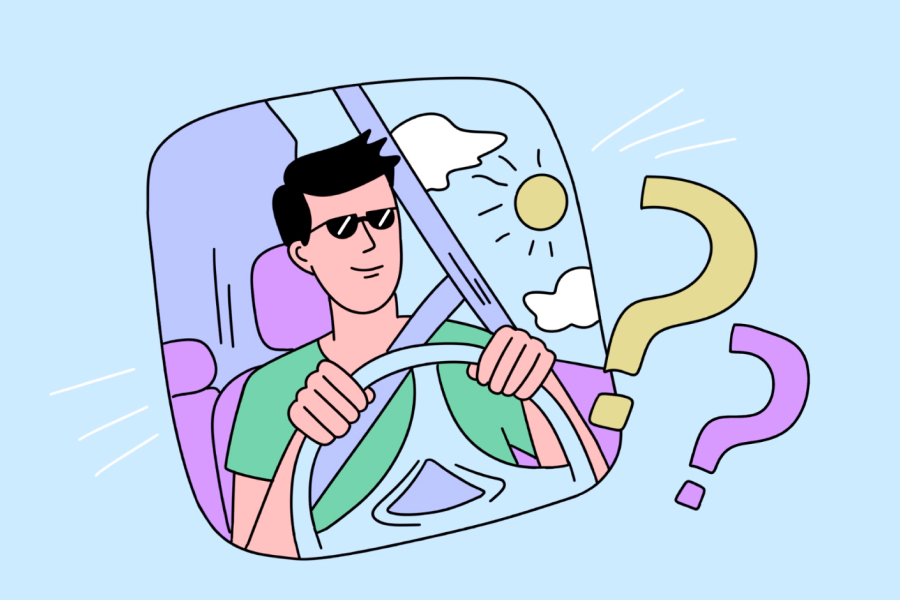
Gig driving is one of the quickest ways to find job opportunities and make extra money. Check our complete guide for independent contractor drivers in 2026, with tips and best practices to help you earn more.
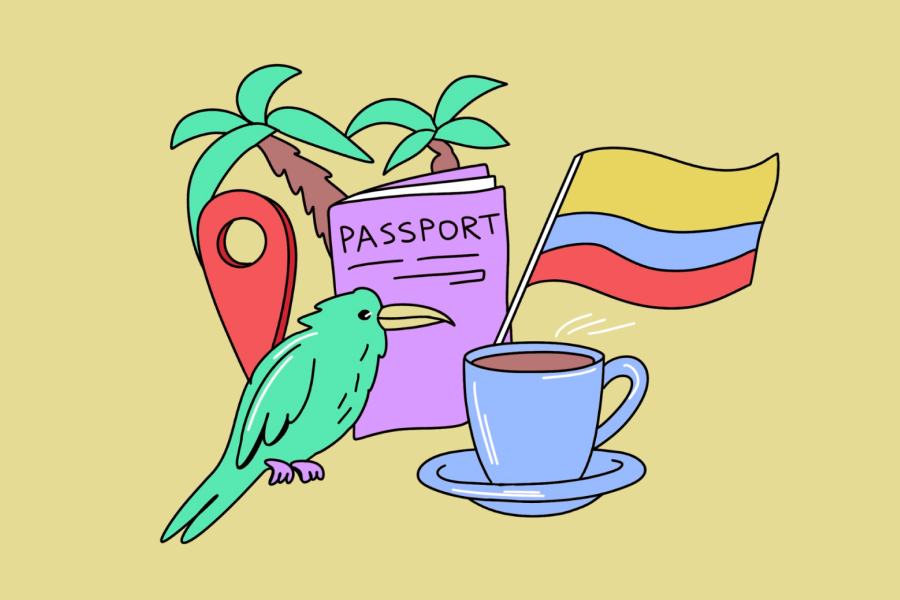
Colombia Digital Nomad Visa: learn how to apply, eligibility requirements, and best spots for remote work in one of the most biodiverse countries.
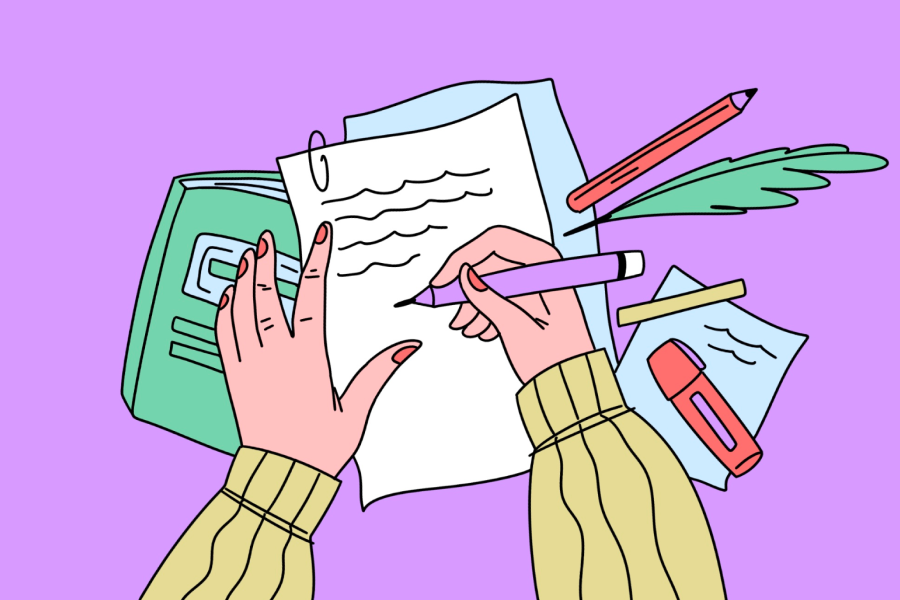
Discover the essential steps to become a copywriter, from understanding the role and choosing your career path to landing your first clients and scaling your rates. Learn which skills matter most, how to build a portfolio, and practical strategies to grow a sustainable copywriting career in 2026.


.JPG)